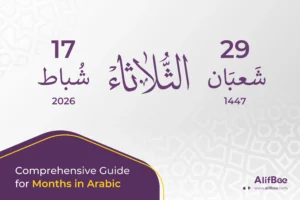
10 Most Common Questions About Ramadan Rules
What time can you eat during Ramadan? Can you drink water, brush your teeth, or smoke? Clear answers to the most common Ramadan rules.
Understanding family terms in Arabic is a wonderful way to gain a deeper understanding of Arab culture, as the concept of family means everything in most Arab countries especially when it comes to introductions, storytelling, and the beginning of friendships.
When you can talk about family in Arabic, you are going beyond language — you create respect and a genuine connection.
In this article, we will talk about all of your family members in Arabic, from parents to siblings, as well as cousins, uncles, aunts, etc. We will also teach you how to talk about family in Arabic in a natural way, just like native Arabic speakers would.
English Meaning
Pronunciation
Arabic
Family
‘ā’ilah
عائلة
Family
usrah
أسرة
My family is large.
‘Ā’ilatī kabīrah jiddan.
عائلتي كبيرة
The word عائلة (‘ā’ilah) usually means your extended family in Arabic that includes grandparents, uncles, aunts, and cousins. The word أسرة (usrah) is used for your immediate family (your closest circle), like your parents and siblings.
English Meaning
Pronunciation
Arabic
Relatives
aqārib
أقارب
I love visiting my relatives in summer
Uḥibbu ziyārat aqāribī fī al-ṣayf
أحب زيارة أقاربي في الصيف.
The word أقارب (aqārib) means relatives in Arabic, and it comes from the root q–r–b, which means “to be close.” So, in the language, relatives are seen as “the ones who are close.” This shows that family in Arabic isn’t just about blood, it’s also about being close at heart.
English Meaning
Pronunciation
Arabic
Father
ʾab
أب
My father is a respected man.
Abii rajul muḥtaram.
أبي رجل محترم
English Meaning
Pronunciation
Arabic
Mother
umm
أم
I love my mother more than anything
Uḥibbu ummī akthar min ayy shayʾ
أحب أمي أكثر من أي شيء.
English Meaning
Pronunciation
Arabic
Son
ibn
ابن
This is my little son
Hādhā ibni al-ṣaghīr.
هذا ابني الصغير
English Meaning
Pronunciation
Arabic
Daughter
ibnah
ابنة
My daughter studies medicine
Ibnatī tadrusu al-ṭibb.
ابنتي تدرس الطب.
English Meaning
Pronunciation
Arabic
Brother
akh
أخ
My brother lives in Jeddah
Akhī yaskun fī Jeddah
أخي يسكن في جدة.
Brother in Arabic is pronounced with a light “kh” sound — akh. Brotherhood in Arab life extends beyond blood; even close friends often call each other akhī (“my brother”) to show respect and camaraderie.
English Meaning
Pronunciation
Arabic
Sister
ukht
أخت
My sister is very kind
Ukhtī laṭīfah jiddan
أختي لطيفة جدًا.
English Meaning
Pronunciation
Arabic
Husband
zawj
زوج
My husband works in a hospital
Zawjī yaʿmal fī al-mustashfā.
زوجي يعمل في المستشفى.
English Meaning
Pronunciation
Arabic
Wife
zawjah
زوجة
My wife loves cooking
Zawjatī tuḥibbu al-ṭabkh
زوجتي تحب الطبخ.
Arab families extend far beyond the home. It’s common to live close to uncles, aunts, and cousins, sometimes even in the same neighborhood. Understanding these family members in Arabic helps you truly understand how Arab societies value kinship.
English Meaning
Pronunciation
Arabic
Grandfather
jadd
جد
My grandfather loves old stories
Jaddī yuḥibbu al-ḥikāyāt al-qadīmah
جدي يحب الحكايات القديمة.
English Meaning
Pronunciation
Arabic
Grandmother
jaddah
جدة
My grandmother prays every morning
Jaddatī tuṣallī kulla ṣabāḥ
جدتي تصلي كل صباح.
English Meaning
Pronunciation
Arabic
Paternal Uncle
‘amm
عمّ
My uncle lives in Cairo
Ammī yaʿīsh fī al-Qāhirah.
عمي يعيش في القاهرة.
Uncle in Arabic differs depending on which side of the family he’s from. The paternal uncle, ‘amm, is your father’s brother.
English Meaning
Pronunciation
Arabic
Paternal Aunt
‘ammah
عمّة
My aunt visits us every week
‘Ammatī tazūrunā kull usbu‘.
عمتي تزورنا كل أسبوع.
English Meaning
Pronunciation
Arabic
Maternal Uncle
khāl
خال
My uncle is a cheerful man
Khālī rajul mariḥ.
خالي رجل مرح.
Uncle in Arabic here refers to the maternal uncle, your mother’s brother, known in Arabic as khāl.
English Meaning
Pronunciation
Arabic
Maternal Aunt
khālah
خالة
My aunt loves traveling.
Khālatī tuḥibbu al-safar.
خالتي تحب السفر
English Meaning
Pronunciation
Arabic
Nephew
ibnu akh
ابنُ أخ
Nephew
ibnu ukht
ابنُ أخت
My nephew loves sports.
Ibnu akhī yuḥibbu al-riyāḍah.
ابن أخي يحب الرياضة
English Meaning
Pronunciation
Arabic
Niece
bint akh
بنت أخ
Niece
bint ukht
بنت أخت
My niece is small and cute
Bint ukhtī ṣaghīrah wa jamīlah
بنت أختي صغيرة وجميلة.
English Meaning
Pronunciation
Arabic
Cousin (father’s brother’s son)
ibn ‘amm
ابن عم
Cousin (father’s brother’s daughter)
ibnat ‘amm
ابنة عم
Cousin (mother’s brother’s son)
ibn khāl
ابن خال
Cousin (mother’s brother’s daughter)
ibnat khāl
ابنة خال
English Meaning
Pronunciation
Arabic
Father-in-law
ḥamū
حمو
Mother-in-law
ḥamāh
حماة
Son-in-law
ṣihr
صهر
Daughter-in-law
kannah
كَنَّة
Brother-in-law
zawj al-ukht
زوج الأخت
Sister-in-law
zawjat al-akh
زوجة الأخ
Learning family in Arabic is much easier when it feels personal and fun! Here are some simple ways to remember family members in Arabic naturally:
Start by drawing your family tree. For each person, write their name in Arabic, with the English meaning and how to say it:
Example:
أمي (ummī – my mother), أبي (abī – my father), أختي (ukhtī – my sister).
You can also download the Arabic Family Tree sheet, print it or use it on your device to label each family member in Arabic.
Start with your immediate family, then move to extended family, and then in-laws. You’ll notice patterns like:
Make simple flashcards with Arabic on one side and English on the other. Say each word out loud to practice how it sounds. Repeating words often helps you remember them faster.
The best way to make new Arabic words stick is to use them in real speech. Say sentences about my family in Arabic aloud so your tongue will get used to the sounds, and the words will start to feel natural. (See section below)
See how much you remember. Fill in the blanks:
Answers
1.أم 2. خال 3. عائلة 4. أخت 5. حمو
Now let’s look at how people actually talk about family in Arabic. Practice them with a friend, or even by yourself.
English Meaning
Pronunciation
Arabic
Who is in your family?
Man fī usratik?
من في أسرتك؟
In my family, there’s my dad, my mom, my sister, and my brother.
Fī usratī abī wa ummī wa ukhtī wa akhī.
في أسرتي أبي وأمي وأختي وأخي
English Meaning
Pronunciation
Arabic
Do you visit your relatives often?
Hal tazūru aqāribaka kathīran?
هل تزور أقاربك كثيرًا؟
Yes, I visit my uncle and aunt every week.
Na‘am, azūru ‘ammī wa khālatī kull usbu‘
نعم، أزور عمي وخالتي كل أسبوع
English Meaning
Pronunciation
Arabic
My family is small but loving.
‘Ā’ilatī ṣaghīrah lakinnahā mutaḥabbah.
عائلتي صغيرة لكنها متحابة
Even learners who’ve been studying Arabic for a while still make some of these mistakes. Here are a few to look out for:
English Meaning
Pronunciation
Arabic
Notes
Family
‘ā’ilah / usrah
عائلة / أسرة
Both mean “family”
Father
ʾab
أب
My father = أبي
Mother
umm
أم
My mother = أمي
Brother
akh
أخ
My brother = أخي
Sister
ukht
أخت
My sister = أختي
Uncle
‘amm / khāl
عمّ / خال
Paternal / maternal
Aunt
‘ammah / khālah
عمّة / خالة
Paternal / maternal
Cousin
ibn ‘amm / ibn khāl
ابن عم / ابن خال
Based on side of family
Grandfather
jadd
جد
Grandmother
jaddah
جدة
Father-in-law
ḥamū
حمو
Mother-in-law
ḥamāh
حماة
Mastering family in Arabic helps you build real connections. When you talk about family members in Arabic, you’re sharing the values of love, respect, and belonging that are so important in Arab culture.
If you want to grow your vocabulary even more, check out this: 10 Arabic Phrases About Family and Relationships
And download AlifBee for a free 14-day trial, so you can start practicing Arabic with structured lessons
Author
Munia Jamal is a content and copywriter with 4+ years of experience in SEO writing, storytelling, and journalism, specializing in Arabic language learning and human-centered narratives from Gaza. She holds a Master’s in Sustainable Development from Al-Quds University and a Bachelor of Pharmacy from Al-Azhar University.


Achieve incredible results with our platform Learn Arabic Online with AlifBee

Join AlifBee Virtual School and master Arabic at your pace — from guided coaching to interactive self-learning.

Learn Arabic faster with live, one-on-one sessions tailored to your level and goals.

Explore AlifBee’s complete range of Arabic learning books for all ages!

What time can you eat during Ramadan? Can you drink water, brush your teeth, or smoke? Clear answers to the most common Ramadan rules.

Short Duas for Ramadan in Arabic and English. Learn short supplications in Arabic and English to connect with Allah (SWT) this holy month. Download Free Daily Dua PDF

Learn how to say months in Arabic with clear tables, pronunciation tips, and explanations of Gregorian and Hijri calendars for learners.

Learn how to say OK in Arabic! Discover common phrases and useful words like *tayyib* & * tamam* to use in everyday Egyptian Arabic conversation.